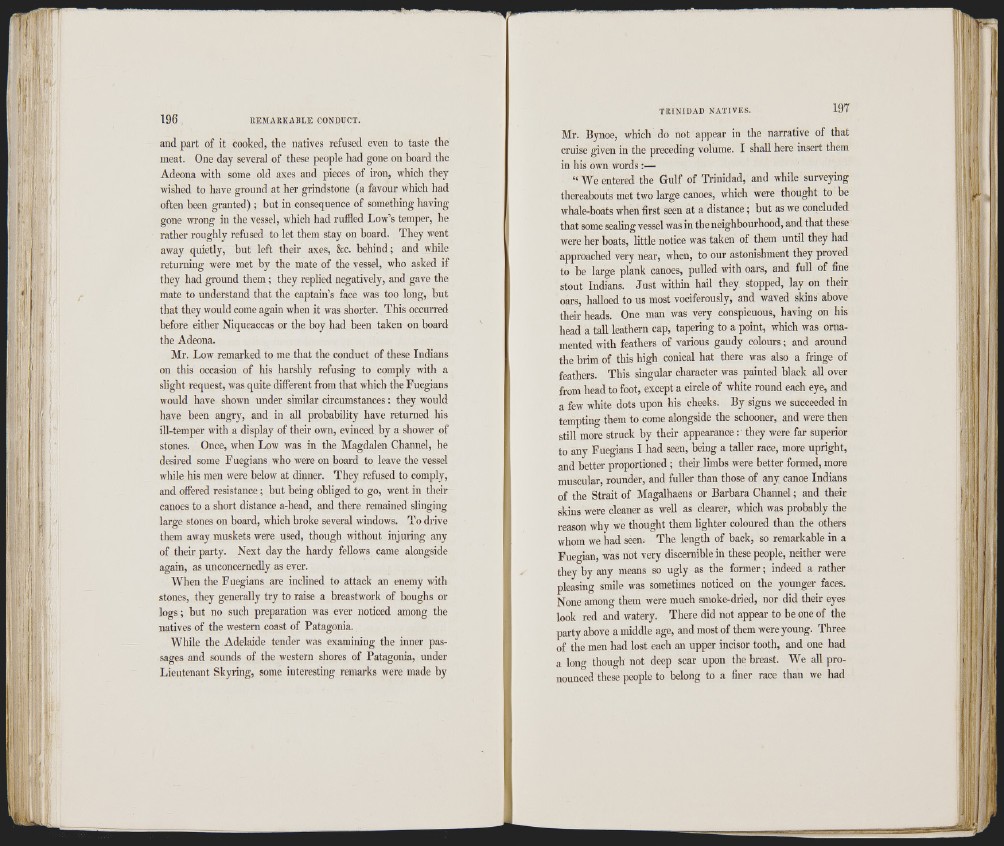
It
7
tp
I
( )
1 '0 , ; i'l il i
and part of it cooked, tbe natives refused even to taste the
meat. One day several of these people had gone on board the
Adeona with some old axes and pieces of iron, which they
wished to have ground at her grindstone (a favour which had
often been granted) ; but in consequence of something having
gone wrong in the vessel, which had ruffled Low’s temper, he
rather roughly refused to let them stay on hoard. They went
away quietly, but left their axes, &c. behind; and while
returning were met by the mate of the vessel, who asked if
they had ground them; they replied negatively, and gave the
mate to understand that the captain’s face was too long, but
that they would come again when it was shorter. This occurred
before either Niqueaccas or the boy had been taken on board
the Adeona.
Mr. Low remarked to me that the conduct of these Indians
on this occasion of his harshly refusing to comply with a
slight request, was quite different from that which the Luegians
would have shown under similar circumstances: they would
have been angry, and in all probability have returned his
ill-temper with a display of their own, evinced by a shower of
stones. Once, when Low was in the Magdalen Channel, he
desired some Luegians who were on board to leave the vessel
while his men were below at dinner. They refused to comply,
and offered resistance ; but being obliged to go, went in their
canoes to a short distance a-head, and there remained slinging
large stones on board, which broke several windows. To drive
them away muskets were used, though without injuring any
of their party. Next day the hardy fellows came alongside
again, as unconcernedly as ever.
When the Luegians are inclined to attack an enemy with
stones, they generally try to raise a breastwork of boughs or
logs ; but no such preparation was ever noticed among the
natives of the western coast of Patagonia.
While the Adelaide tender was examining the inner passages
and sounds of the western shores of Patagonia, under
Lieutenant Skyring, some interesting remarks were made bj»
Mr. Bynoe, which do not appear in the narrative of that
cruise given in the preceding volume. I shall here insert them
in his own words :—
“ We entered the Gulf of Trinidad, and while surveying
thereabouts met two large canoes, which were thought to be
whale-boats when first seen at a distance ; but as we concluded
that some sealing vessel was in the neighbourhood, and that these
were her boats, little notice was taken of them until they had
approached very near, when, to our astonishment they proved
to be large plank canoes, pulled with oars, and full of fine
stout Indians. Just within hail they stopped, lay on their
oars, halloed to us most vociferously, and waved skins above
their heads. One man was very conspicuous, having on his
head a tall leathern cap, tapering to a point, which was ornamented
with feathers of various gaudy colours; and around
the brim of this high conical hat there was also a fringe of
feathers. This singular character was painted black all over
from head to foot, except a circle of white round each eye, and
a few white dots upon his cheeks. By signs we succeeded in
tempting them to come alongside the schooner, and were then
still more struck by their appearance : they were far superior
to any Luegians I had seen, being a taller race, more upright,
and better proportioned ; their limbs were better formed, more
muscular, rounder, and fuller than those of any canoe Indians
of the Strait of Magalhaens or Barbara Channel; and their
skins were cleaner as well as clearer, which was probably the
reason why we thought them lighter coloured than the others
whom we had seen. The length of back, so remarkable in a
Fuegian, was not very discernible in these people, neither were
they by any means so ugly as the former; indeed a rather
pleasing smile was sometimes noticed on the younger faces.
None among them were much smoke-dried, nor did their eyes
look red and watery. There did not appear to be one of the
party above a middle age, and most of them were young. Three
of the men had lost each an upper incisor tooth, and one had
a long though not deep scar upon the breast. AVe all pronounced
these people to belong to a finer race than we had